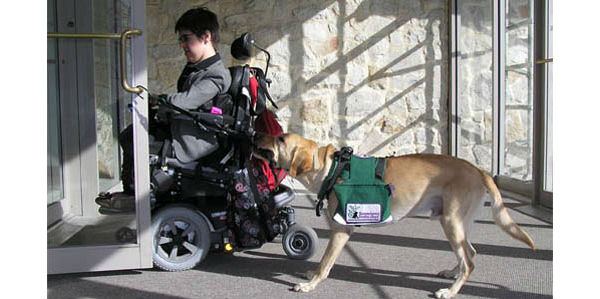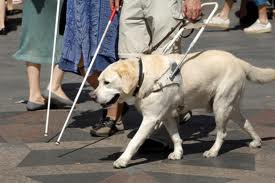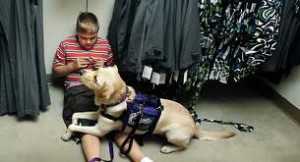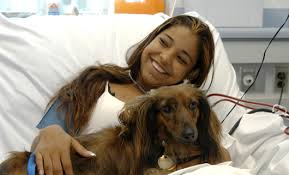
A Complete Guide to Service, Therapy and Emotional Support Dogs
Have you ever thought about getting a service dog to help you or a loved one? What about a therapy dog for school or an emotional support companion dog for home? Here’s a guide to the different types of service dogs and a few of the organizations that train both dogs and owners.
Service Dogs
The Americans With Disabilities Act (ADA) of 2011 defines service dogs as those trained to do work directly related to a person’s disability. Emotional support animals and dogs used as crime deterrents are excluded from this definition. A service dog is expected to accompany a person with a disability at all times.
Over 90% of service dog handlers say that their animals improve their quality of life by assisting with life skills and increasing physical activity and community involvement. Each service dog is matched to an handler’s unique needs after extensive training to perform specific tasks while maintaining a calm temperament. Before going home, the new handler also receives instruction for the animal’s care and handling.
Most service dogs receive training in one of the following areas:
Mobility Assistance:
- Opens doors using a strap
- Pushes doors closed
- Assists with dressing/undressing
- Assists wheelchair user to upright position when slumped over
- Moves feet onto wheelchair footrests, moves arms to wheelchair armrests
- Prevents fall by bracing handler
- Retrieves wheelchair or walker when out of reach
- New Life Mobility Assistance Dogs
- 4 Paws For Ability
- Shore Service Dogs, Inc.
- Pawsibilities Unleashed, LLC
- New Horizons Service Dogs
Medical Response (seizures, diabetes, severe allergies):

- Retrieves medication,
- Calls 911 in an emergency,
- Opens door for first responders,
- Identifies medical symptoms and gets help
- Lies down on chest to help person cough or take a breath
- Barks for help or finds help on command.
- Service Dogs for America
- Service Dogs for Independence
- Canine Assistants
- Alert Service Dogs (diabetic emergency response)
- Angel Service Dogs (anaphylactic allergy response)
Signal (Hearing Impairment):
- Alerts handler to the presence of people or sounds
- Retrieves unheard dropped objects
- Carries messages
- Warns of vehicle approaching from behind
 Guide (Visual Impairment):
Guide (Visual Impairment):
- Avoids obstacles or moving vehicles
- Signals changes in elevation
- Locates object or person on command
- Retrieves dropped objects
 Autism Assistance:
Autism Assistance:
- Braces handler for stability while walking,
- Finds specific places such as home or car when owner is disoriented
- Finds and retrieves wandering handler to a safe place
- Helps handler fall asleep during insomnia episodes,
- Signals self-stimulatory behaviors
- Interrupts self-harming behaviors
- Places body on chest or lap for deep pressure during panic attack or meltdown
- Signal significant sounds such as smoke alarm
- Guides around obstacles in visually confusing situations
Psychiatric Assistance:
- Assesses safety of situation in cases of paranoia or hallucinations
- Guides handler away from stressful situations
- Interrupts flashbacks and self-harming behaviors
- Reminds handler to take medication
- Retrieves medication and other important objects
- Braces handler to prevent fall
- Calls 911 or gets help in emergency
Therapy Dogs/Facility Dogs
 Therapy dogs are trained to provide affection and comfort to children and adults who need emotional support or people in stressful situations.
Therapy dogs are trained to provide affection and comfort to children and adults who need emotional support or people in stressful situations.
These dogs are typically mature pets with calm temperaments, they enjoy being petted by lots of different people and are not easily frightened or excited. Therapy dogs visit schools, group homes, nursing homes hospices and hospitals.
 At school, students may find it easier to read a book to a therapy dog than to a teacher. After a natural disaster such as a tornado or hurricane, therapy dogs can help comfort people who have suffered a loss. Many physicians agree that therapy dogs can decrease the levels of the stress hormone cortisol in hospital patients while increasing the hormones oxytocin and dopamine, which are associated with feelings of attachment and happiness.
At school, students may find it easier to read a book to a therapy dog than to a teacher. After a natural disaster such as a tornado or hurricane, therapy dogs can help comfort people who have suffered a loss. Many physicians agree that therapy dogs can decrease the levels of the stress hormone cortisol in hospital patients while increasing the hormones oxytocin and dopamine, which are associated with feelings of attachment and happiness.
Where to find therapy dogs:
- Canine Companions for Independence
- Delta Society Pet Partners
- Love on a Leash
- Bright and Beautiful Therapy Dogs
- West Michigan Therapy Dogs, Inc.
Emotional Support Animal/Companion animal
Emotional support dogs usually do not have specialized training, although sometimes they are trained to call 911 in an emergency. These animals are chosen for their gentle, calming temperament, and may be of any size or breed.
While therapy dogs work outside the home with groups of people, emotional support animals primarily provide comfort at home for one or two people. Federal law in the USA allows people with disabilities and psychiatric conditions to live with their emotional support animals even in housing that prohibits dogs.
 Airlines also have a broad definition of assistance animals that allows emotional support animals to fly with their handlers. The handler must provide a recent letter from a physician prescribing the emotional support animal for a specific physical or mental illness that limits one or more life activities in order to apply for housing or to fly with the dog.
Airlines also have a broad definition of assistance animals that allows emotional support animals to fly with their handlers. The handler must provide a recent letter from a physician prescribing the emotional support animal for a specific physical or mental illness that limits one or more life activities in order to apply for housing or to fly with the dog.
Do you have a service dog? How has your dog helped you?



